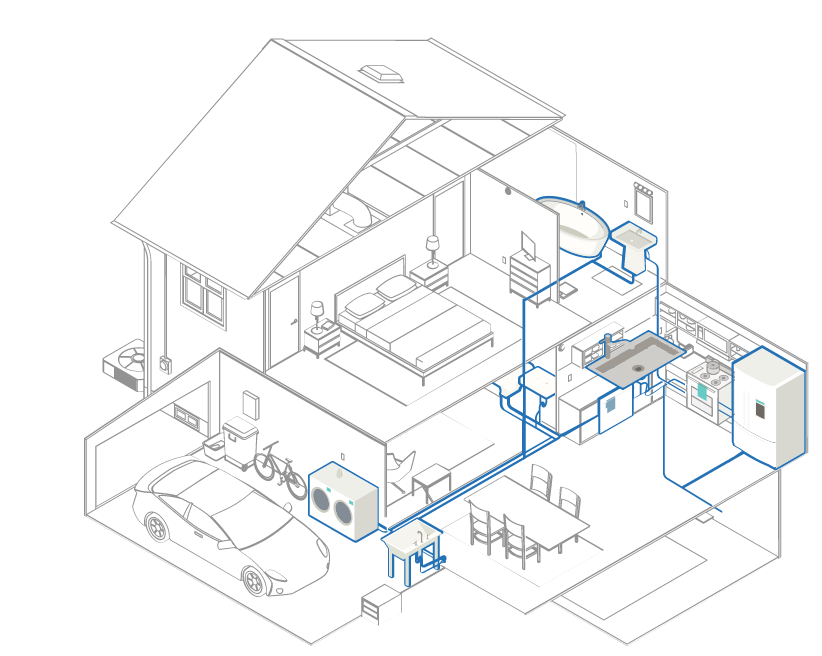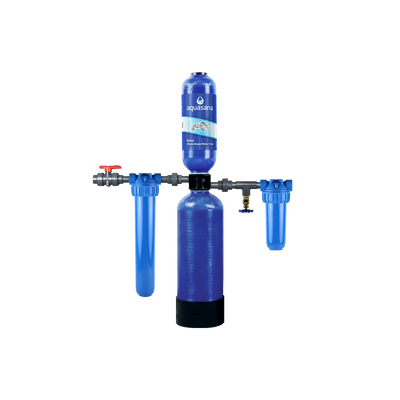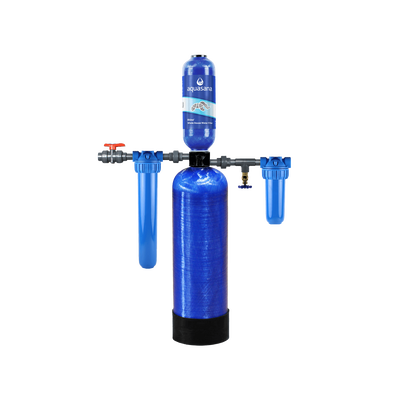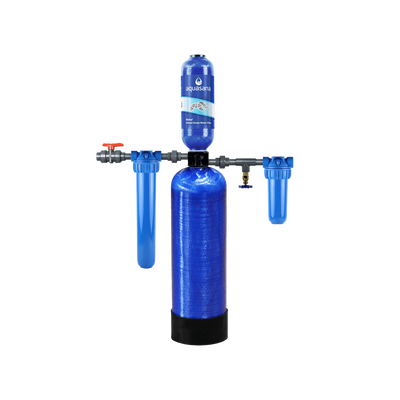
Which contaminants do Whole House Water Filters address?
Before choosing a whole house water filtration system, you'll need to determine which contaminants are in your water that you want to address. We offer different whole home systems specifically tailored to your home's water issues, whether it’s municipal water treated with chlorine/chloramines, or untreated well water.
Chlorine
Chlorine is commonly used by water suppliers to disinfect public tap water. Although it has a low staying power, when it is present, chlorine has a distinct impact on the smell and taste of your water.Chlorine can also be harsh on skin and hair, causing everything from dry skin to split ends. Bright colors could also be a casualty when your favorite clothes meet chlorine-treated water in the washing machine.
Chloramines
Chloramines are a solution of 5-parts chlorine and 1-part ammonia that are becoming increasingly popular in the treatment of public tap water. Chloramine is an aggressive disinfectant, and while it prolongs the amount of time your water remains disinfected, it also makes filtering it more difficult. Another concern about chloramines is their potential effect on lead or copper pipes. The CDC states, “Chloramine can change the chemical properties of the water, which can affect lead and copper pipes.” While the CDC insists that this is not an issue because lead and copper are strictly regulated, we know that the EPA has struggled to contend with lead in recent years.
Heavy metals like lead and mercury
Most people are aware of the dangers of heavy metals in water supplies, especially following news coverage of events like the water crisis in Flint, MI. Even after water is treated by a municipality, trace amounts can be picked up from water lines and pipes as it travels to your home. Exposure to these metals is associated with health risks including damage to the brain and kidneys, changes in vision or hearing, and reproductive issues among others. Not every whole house filter reduces heavy metals, so if these contaminants are present in your water, confirm that the filter you're considering is tested and proven to tackle them, such as Aquasana's OptimH2O®.
Herbicides, pesticides, and VOCs
In agricultural areas, water may be contaminated by harmful chemicals used as pesticides or fertilizers. Exposure to chemical contaminants in water may increase the risk of cancer and is associated with reproductive problems and impairment of body functions in areas like the eye, liver, and kidney. Again, not every whole house filter reduces these contaminants, so if they are present in your water, confirm that the filter you're considering is tested and proven to filter them.
How to find out what’s in your water
The EPA requires water suppliers to distribute a Consumer Confidence Report (CCR) or an annual Drinking Water Quality Report. You should receive this report by July 1st each year. Some cities even publish their water quality report in their semi-annual magazines. Within the report, you’ll see how your water is treated A. You’ll also be notified if there are any specific concerns regarding your area.
You can access your water quality report year-round by visiting your city’s official website. For example, residents of Austin, Texas would visit austintexas.gov/department/water-quality-reports.
If you’re still unsure of how to access your CCR, check out this interactive map on the EPA’s website. While not all water suppliers have provided a direct link, you can type in your zip code and find out exactly who your water supplier is and how to contact them.
Once you’ve checked out your CCR, research the contaminants to determine if you need a water filtration system based on their severity.
What is the best Whole House Water Filtration System for your home?
Let’s break down the basic whole home filtration system and potential additions to identify which one is best for your home. The basic system is comprised of carefully sequenced stages, each with its own unique formula. Once you know what your water is treated with (i.e. if it’s untreated well water, municipal water, etc.), there is an appropriate system for each:
The Rhino® Well Water with UV sterilizes 99.99% of all viruses and bacteria and 99% of cysts that can live in untreated well water. This well water filter lasts 500,000 gallons.
The Rhino® uses KDF 55 and granular carbon. Granular active carbon (GAC) filtration is the most effective at removing chlorine. This filter reduces 97% of chlorine for your whole home. This chlorine filter lasts for 1,000,000 gallons.
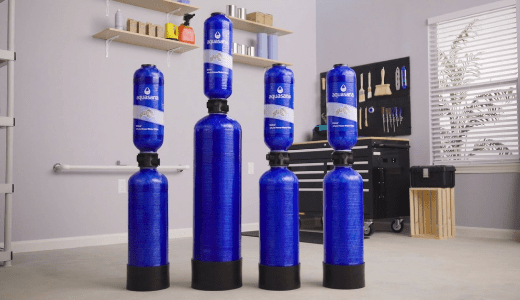
Some cities use chlorine in their water treatment systems, while others use chloramines. Not sure which you need to remove from your water? Contact an Aquasana water expert and they can help you.
The OptimH2O® Whole House Filter System uses a 0.5 micron-rated, ultra-dense carbon block. Both catalytic carbon and activated carbon are combined in this first-of-its-kind filter certified to reduce more than 99% of lead and cysts, 98% of PFOA/PFOS, and additionally, tackles chlorine, and chloramines. This revolutionary system reduces more lead and PFOA/PFOS than any other whole house system available. The OptimH2O® water filter is IAPMO certified to NSF standards to reduce contaminants no matter how your city water is treated. This whole home filter lasts 100,000 gallons.
WHOLE HOUSE WATER FILTER
OptimH2O®
Tested and certified to reduce lead, cysts, and PFOA/PFOS, plus tackles chlorine and chloramines.
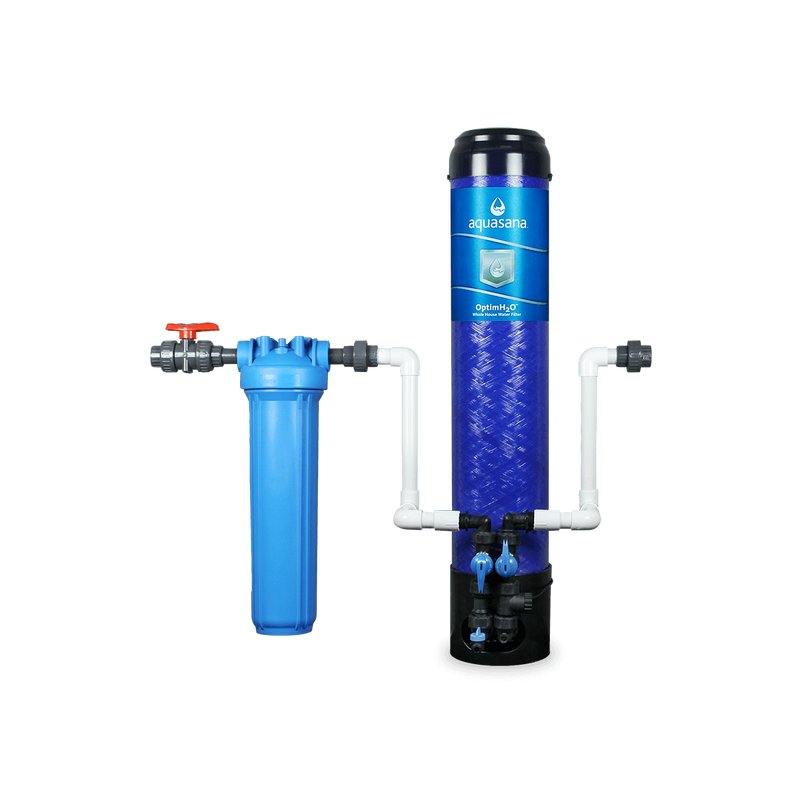
Whole House Water Filtrations System upgrade options
Beyond the base system, you can choose additional options to provide extra support for a complete home filtration system:
- The Sediment Pre-Filter catches rust, sediment, and silt for long lasting system performance.
- The Salt-Free Water Conditioner acts as a descaler, preventing minerals from binding and building up in your appliances, pipes, and plumbing.
- The Sub-Micron Post-Filter reduces any remaining sediment and organic particles down to .35 microns— smaller than the eye can see.
- The UV Filter acts as a safeguard against bacteria and viruses that could be present in your water.
Depending on the contaminants in your water, you may find that a whole house water filtration system is the best way to provide full-home protection. Shop systems to get filtered water from every tap!
